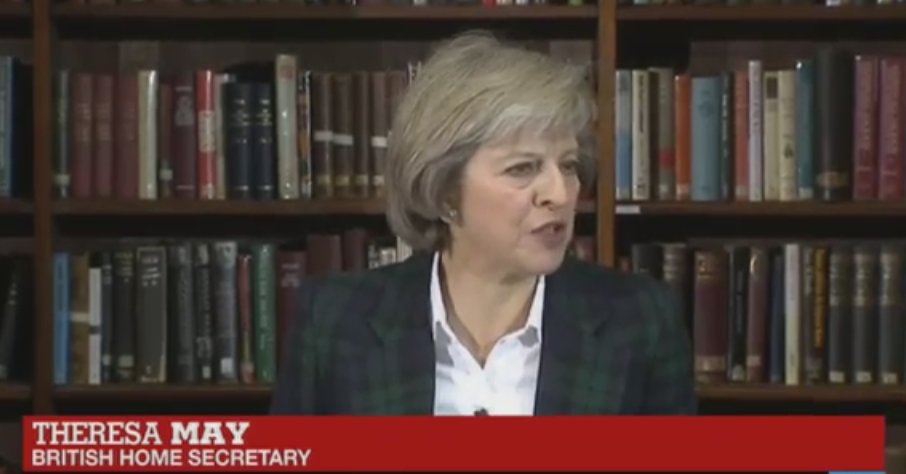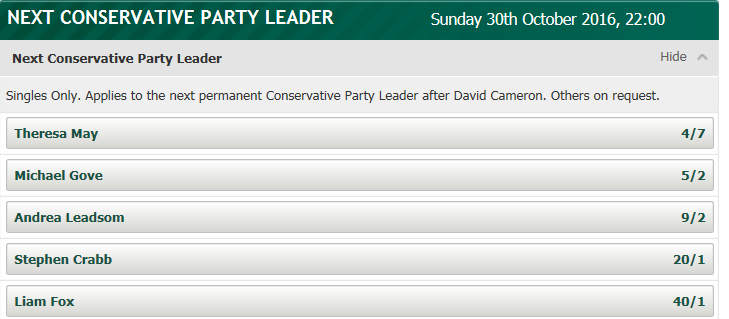Verbatim: What Theresa May said on a Brexit, an election and negotiations
Theresa May is the prohibitive favourite to be the next Prime Minister

Even before Boris Johnson dropped out, Theresa May was the betting favourite. A poll put Johnson as the only person within striking distance. Now betting sites put her as a relative shoe-in.

May was a soft Remain supporter during the referendum and might have steered her leadership candidacy in that direction. Instead, she was unequivocal in her first post-announcement comments.
Theresa May speech highlights
"The country voted to leave the European Union, and it is the duty of the government and of parliament to make sure we do just that."
"Brexit means Brexit ... the public gave their verdict. There must be no attempts to remain inside the EU, no attempts to rejoin it through the backdoor, and no second referendum."
"There should be no general election until 2020. There should be a normal autumn statement held in the normal way, at the normal time, and no emergency budget.
"There should be no decision to invoke article 50 before the British negotiating strategy is agreed and clear, which means article 50 should not be invoked until the end of this year."
Her Brexit tactics
Those declarations are seemingly crystal clear but she did leave some wiggle room later. She said she would like to remain in the single market if there were controls on immigration.
Overall, she framed the Brexit vote as an anti-immigration vote, rather than a protest against EU regulations, a protectionist backlash or a reassertion of sovereignty.
That's a critical point because it shows how she will negotiate with EU leaders and how she could reach a compromise.
Verbatim:
"Negotiating the best possible terms as we leave the European Union will be crucial to our prosperity."
"I intend in the coming weeks to set out in some more detail my proposed negotiating principles."
"It is going to take a period of several years to disentangle ourselves from the Brussels machinery."
"I will create a new department to negotiate an exit ...and I will make sure that department is led by a member of parliament who campaigned for Britain to leave the EU.
"While the ability to trade with EU member states is vital to our prosperity, there is clearly no mandate for a deal that involves accepting the free movement of people as it has worked hitherto."
"I want to be clear that as we conduct our negotiations, it must be a priority to allow British companies to trade with the single market in goods and services but also to regain more control over the number of people who are coming here from Europe."
That last two lines are critical. There is an easy path for the EU here and it's to give Britain special free movement rights. EU leaders say that's unacceptable but I think we'll find otherwise. Economically, if that's the agreement, there would be almost zero impact.
Alternatively, the EU can stand pat and I think May will blink. She isn't showing much of an appetite for a fight here.
Her team
Aside from words, there were actions. She signed up prominent Leave campaigner Chris Grayling to chair her candidacy.
Another action was from Jeremy Hunt, who considered running but threw his support behind May.
"I have decided that now is not the right time for me to run for the leadership - though I remain completely committed to ensuring we secure our position as a great trading nation with sensible controls on migration. I believe that Theresa May has the strength, judgment and values to deliver those things. She is the right choice to lead Britain in a challenging period and will make a truly outstanding prime minister," Hunt said.
Once again, he's framing the Brexit vote as anti-immigration but his priority is trade.
Another note on how she could challenge immigration while staying in the EU
She introduced onerous minimum salary thresholds for non-E.U. workers wanting to move to the U.K. and a $25,000 minimum salary requirement for British citizens seeking to bring over a spouse or child to the UK.
Verdict
There is a switcheroo happening here. It wasn't a referendum on restricting immigration, even if that was a large part of the Brexit campaign. The question was whether or not to leave the EU. It didn't ask people which parts of the EU they liked and which they didn't.
In any case, it's early days still but it's clear to me that May isn't willing to sacrifice any access to the EU market in order to keep out immigrants.


